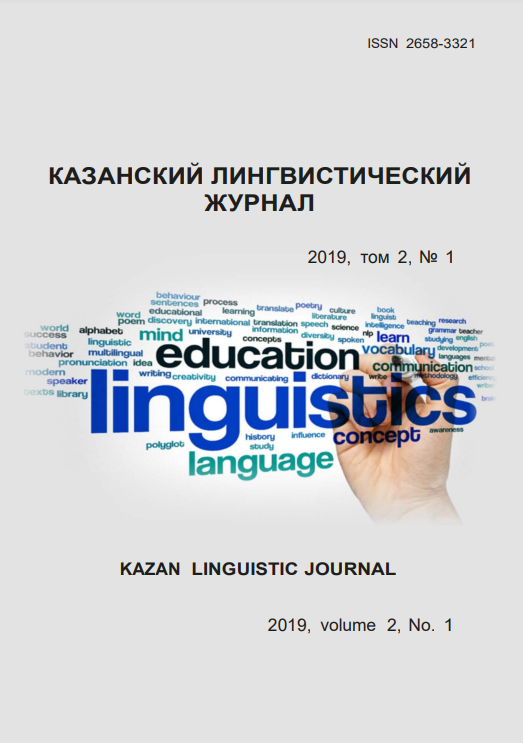Compounding, conversion and abbreviation as ways of formation of chemical terminology in English and tatar languages
Keywords:
compounding, conversion, abbreviations, terminology, chemical terminology, the English language, the Tatar languageAbstract
Terminology plays an important role in science. Without knowledge of terminology it is impossible to be an expert in any of the scientific spheres of life. The rapid development of science leads to the emergence of new terms. Thus, the systematization and standardization of chemical terminology is an important question today. The article deals with the methods of word formation in English and Tatar chemical terminology on the example of compounding, conversion and abbreviation. The choice of these methods of term formation is due to their high productivity. The purpose of the present study is to identify the features of these methods of word formation in the chemical term system of two genetically unrelated and typologically diverse languages and to determine their linguistic representation in academic texts. The general models of word composition typical for the languages studied in this article are considered and presented. There are differences in models that are productive for each language in case of conversion. In the presentation of the abbreviation we presented models which are common both for the English and the Tatar languages.
References
Литература
Закиева З. Р. Способы словообразования как фактор системности терминологии химии в татарском языке // Вестник ЧелГУ. 2011. №8. // URL: https://cyberleninka.ru/article/n/sposoby-slovoobrazovaniya-kak-faktor-sistemnosti- terminologii-himii-v-tatarskom-yazyke (дата обращения: 20.12.2018).
Котюрова М.П., Баженова Е.А. Культура научной речи: текст и его редактирование. М.: Флинта: Наука, 2008. 280 с.
Кузнецова Н.В. Методика преподавания химии. Учебное пособие для студентов педагогических институтов по химическим и биологическим специальностям. Москва. "Просвещение". 1984. 415 с.
Мифтахова Н. Ш. Русско-татарский словарь химических терминов / под. ред. Н. С. Ахметова. Казань: Магариф, 2002. 199 с.
Реформатский А. А. Термин как член лексической системы языка // Проблемы структурной лингвистики. М.: Наука, 1967.
Сайдашева Э. А. Словообразование в татарском и английском языках на примере конверсии и словосложения: Сопоставительный анализ: автореферат дис. канд. филологических наук: Казань, 2006. 24 с.
Татарская грамматика: в 3 т. / М. З. Закиев, Ф. А. Ганиев, Х. Х. Салимов и др. Казань: Татар. кн. изд-во, 1995. Т. 1: Введение. Фонетика. Фонология. Просодика. Графика и орфография. Орфоэпия. Основные понятия грамматики. Морфемика. Морфонология. Словообразование. 583 с.
Химический русско-татарский толковый словарь / под общ. ред. Г. Г. Хисамеева. Казань: Магариф, 2004. 344 с.
Chang R. Chemistry. Tenth edition. Higher Education. 2009. 1170 p.
References
Zakieva, Z. R. (2011). Sposoby slovoobrazovaniia kak faktor sistemnosti terminologii khimii v tatarskom iazyke [Methods of word formation as a factor of systematic terminology of chemistry in the Tatar language]. // Vestnik ChelGU. №8.
// URL: https://cyberleninka.ru/article/n/sposoby-slovoobrazovaniya-kak-faktor-sistemnosti-terminologii-himii-v-tatarskom-yazyke (accessed: 20.12.2018). (In Russian)
Kotiurova, M.P., Bazhenova E.A. (2008). Kul'tura nauchnoi rechi: tekst i ego redaktirovanie [Culture of scientific speech: text and its editing]. Moscow: Flinta: Nauka, 280 p. (In Russian)
Kuznetsova, N.V. (1984). Metodika prepodavaniia khimii. Uchebnoe posobie dlia studentov pedagogicheskikh institutov po khimicheskim i biologicheskim spetsial'nostiam [Methods of teaching chemistry. Textbook for students of pedagogical institutes in chemical and biological specialties]. Moscow. "Prosveshchenie". 415 p. (In Russian)
Miftakhova, N. Sh. (2002). Russko-tatarskii slovar' khimicheskikh terminov [Russian-Tatar dictionary of chemical terms]. / pod. red. N. S. Akhmetova. Kazan': Magarif, 199 p. (In Russian and Tatar)
Reformatskii, A. A. (1967). Termin kak chlen leksicheskoi sistemy iazyka [Term as a member of the lexical system of language]. // Problemy strukturnoi lingvistiki. Moscow: Nauka. (In Russian)
Saidasheva, E. A. (2006). Slovoobrazovanie v tatarskom i angliiskom iazykakh na primere konversii i slovoslozheniia: Sopostavitel'nyi analiz [Word formation in the Tatar and English languages on the example of conversion and word composition: Comparative analysis].: avtoreferat dis kand.
filologicheskikh nauk: Kazan', 2006. 24 p. (In Russian)
Tatarskaia grammatika [Tatar Grammar]. (1995).: v 3 t. / M. Z. Zakiev,
F. A. Ganiev, Kh. Kh. Salimov i dr. – Kazan': Tatar. kn. izd-vo. – T. 1: Vvedenie. Fonetika. Fonologiia. Prosodika. Grafika i orfografiia. Orfoepiia. Osnovnye poniatiia grammatiki. Morfemika. Morfonologiia. Slovoobrazovanie. 583 p. (In Russian)
Khimicheskii russko-tatarskii tolkovyi slovar' [Chemical Russian-Tatar dictionary]. (2004). / pod obshch. red. G. G. Khisameeva. Kazan': Magarif. 344 p. (In Russian and Tatar)
Chang, R. (2009) Chemistry. Tenth edition. Higher Education. 1170 p. (In English)






